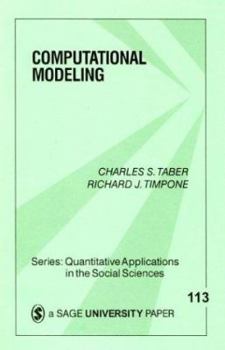Computational Modeling
Why model computationally? Because these methods allow researchers to combine the rich detail of qualitative research with the rigor of quantitative and formal research, as well as to represent complex structures and processes within a theoretical model. The authors treat computational methods, including dynamic simulation (Monte Carlo methods), knowledge-based models (semantic networks, frame systems, and rule-based systems), and machine learning (connectionism, rule induction, and genetic algorithms), as a single broad-based class of research tools and develop a framework for incorporating them within established traditions of social science research. They provide a concise description of each method and a variety of social science illustrations including four detailed examples. Common to most of these methods is a straightforward underlying approach: simulate the theory by running the program. Computational Modeling concludes with a discussion of ways to validate computational models.
Format:Paperback
Language:English
ISBN:0803972709
ISBN13:9780803972704
Release Date:March 1996
Publisher:Sage Publications
Length:104 Pages
Weight:0.29 lbs.
Dimensions:0.3" x 5.4" x 8.4"
Customer Reviews
0 rating





